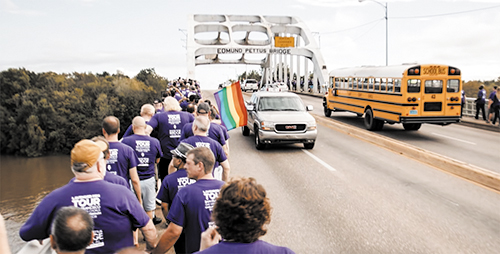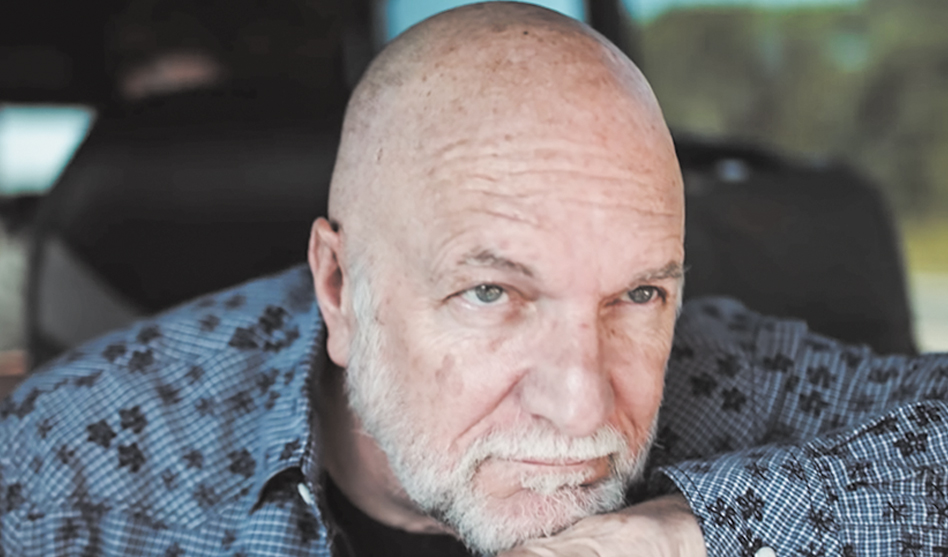Tim Seelig
Tim Seelig and the San Francisco Gay Men’s Chorus star in a documentary about their trip to the Deep South
DAVID TAFFET | Senior Staff Writer
taffet@dallasvoice.com
In a new documentary, Gay Chorus Deep South, San Francisco Gay Men’s Chorus Artistic Director Tim Seelig says, “You have allowed me to come home.”
Seelig, who directed the Turtle Creek Chorale for 20 years and remains its director emeritus, became the director of San Francisco’s even-larger gay men’s chorus in 2011. In 2016, the chorus was planning a trip to China, but for a number of reasons they decided to cancel it. Seelig’s board chair suggested a trip instead to the Deep South, where many of the chorus’ members, including Seelig, grew up.
Logistically, that trip must have been a nightmare — not only because they traveled thousands of miles by bus, but because about 300 people toured — 250 members of the SFGMC and the 50-member gospel choir from Oakland that accompanied them. Then an Oscar-winning producer decided to accompany the group to produce a documentary about their experience.
The purpose of the trip was to promote unity and peace. The trailer to the film says the chorus was singing against discrimination. Seelig said he wanted to include South Carolina, which had just passed a bathroom bill, and Mississippi, which had passed a religious refusal law.
From the stage of his concerts, Seelig tells his story: He was 35 with two kids when he came out. He explained to audiences that the church told him he would say goodbye to his kids, leave town and never come back.
When he’s applauded for his courage, he brushes the applause aside and says, “No, it was shit.” But then he thanks his audience and tells them, “You have allowed me to come home.”
Included in the story are death threats the chorus received in their voicemail before leaving San Francisco as well as the reaction to the chorus by members of churches where the chorus performed.

The San Francisco Gay Men’s Chorus walked across the Edmund Pettus bridge in Selma, Ala.
The San Francisco chorus made 25 appearances in five states and raised money for LGBT nonprofit organizations as they toured. Seelig said it was five or six major performances at concert halls and a variety of smaller appearances.
For example, three doctors who are HIV specialists are members of the chorus. At a stop at the University of Tennessee, they did a program on PrEP. And the chorus’ transgender members led a conversation on campus about trans issues.
One of Seelig’s most-cherished memories of the trip didn’t make it into the film: First Baptist Church of Greenville, S.C., is a megachurch that was one of Southern Baptists’ founding congregations. Seelig described the baptismal font as Olympic-sized.
During his visit he watched a baptism in amazement. A black man was being baptized by a white minister, and that wouldn’t have happened when Seelig was growing up in the South. But what happened next floored him: A white man stood in the pulpit and talked about his husband, who was being baptized.
An interracial same-sex couple was recognized by a Southern Baptist church? Seelig said he learned on this trip there are good people everywhere.
Because of threats received and timing — the trip took place right after the racist attack in Charlottesville — the chorus hired security. Once Charlottesville happened, they doubled security.
At one point when they were at First Baptist, everyone was directed to the fellowship hall. No one at the time knew what was going on, and everyone remained calm. Only later did they learn that there had been a bomb threat, and the entire church was swept.
And that, along with an anti-Trump message, could have been the focus of the film. But, Seelig said, “That’s too predictable for the movie.” So instead of what was obvious, the film is about coming home, healing and reconciling.
Turtle Creek Chorale Artistic Director Sean Baugh took his chorus on a smaller version of the trip undertaken by Seelig two summers ago, with just four cities in three states adjoining Texas plus an East Texas stop.
“It looks like a great capture of a lot of our lives growing up in conservative churches in this part of the country,” Baugh said of Gay Chorus Deep South. He said he’s only seen portions of it so far and is looking forward to the screening.
On the Chorale’s tour, the first stop was in Tulsa, Baugh’s hometown. He said having a row of seats with just his relatives was very healing.
And while the trips for both choruses were planned for the audience, Baugh said it was just as much for the singers. “When we sang at Oral Roberts, it was healing for the people we sang for,” he said. “But it was also healing for us.”
Seelig described the trip as a caravan of six buses, several vans and a police escort both front and rear. A company that only plans foreign tours, including the Turtle Creek Chorale’s two European trips, planned the logistics down to every meal. Seelig said that wasn’t easy since it included meals for 300 in small cities like Selma.
And control freak that he is, Seelig had no control over the film. After a screening, he and his executive director ran back to the office and made pages of notes.
When he turned them in, he was politely told: Thank you, but no thank you.
And that, Seelig explained, is why he says “fuck” twice in the first few minutes of the film.
The documentary has been screened in more than 100 film festivals. Just this week, MTV films ran a full-page ad in the Los Angeles Times promoting the film for an Academy Award. The film opens for a limited run in San Francisco, New York and L.A. to qualify for Oscar consideration before airing on MTV.
A screening at Cathedral of Hope on Nov. 22 is the only screening the production company has approved outside the film festival circuit, and Seelig will be in attendance to talk about the making of the documentary.
The Turtle Creek Chorale and Cathedral of Hope screen the film with Seelig in attendance at 6:30 p.m. on Friday, Nov. 22. Tickets are available at Eventbrite.com. Search Gay Chorus Deep South.


